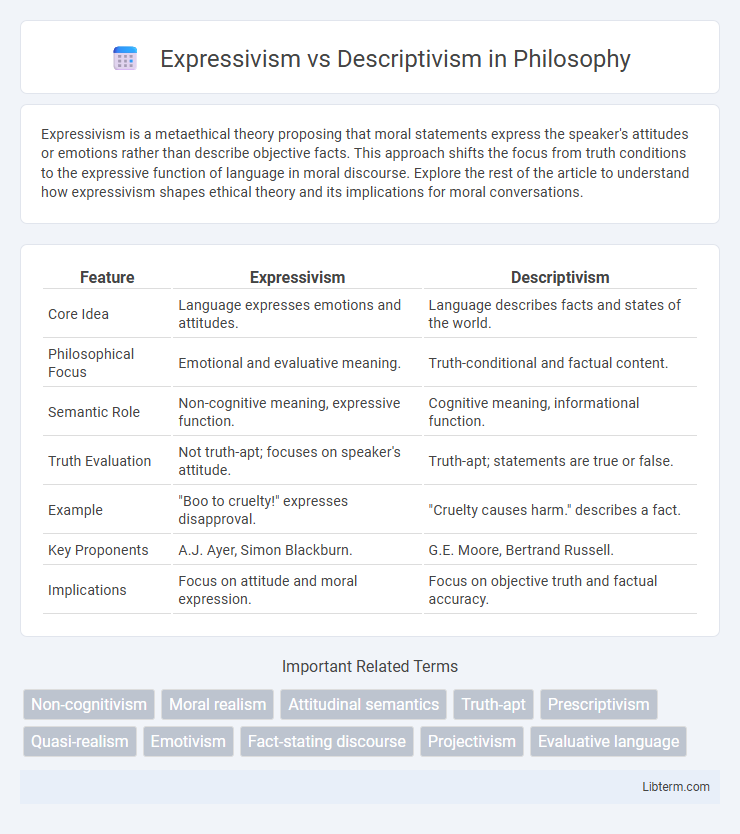Expressivism is a metaethical theory proposing that moral statements express the speaker's attitudes or emotions rather than describe objective facts. This approach shifts the focus from truth conditions to the expressive function of language in moral discourse. Explore the rest of the article to understand how expressivism shapes ethical theory and its implications for moral conversations.
Table of Comparison
| Feature | Expressivism | Descriptivism |
|---|---|---|
| Core Idea | Language expresses emotions and attitudes. | Language describes facts and states of the world. |
| Philosophical Focus | Emotional and evaluative meaning. | Truth-conditional and factual content. |
| Semantic Role | Non-cognitive meaning, expressive function. | Cognitive meaning, informational function. |
| Truth Evaluation | Not truth-apt; focuses on speaker's attitude. | Truth-apt; statements are true or false. |
| Example | "Boo to cruelty!" expresses disapproval. | "Cruelty causes harm." describes a fact. |
| Key Proponents | A.J. Ayer, Simon Blackburn. | G.E. Moore, Bertrand Russell. |
| Implications | Focus on attitude and moral expression. | Focus on objective truth and factual accuracy. |
Introduction to Expressivism and Descriptivism
Expressivism asserts that moral statements express emotional attitudes rather than factual claims, emphasizing the speaker's feelings and intentions. Descriptivism, by contrast, holds that moral language describes objective facts or properties in the world, aiming to convey truth about ethical situations. Both theories explore the function of moral discourse but differ fundamentally in whether ethics is rooted in subjective expression or objective description.
Historical Background and Philosophical Roots
Expressivism and Descriptivism trace their roots to early 20th-century analytic philosophy, with expressivism emerging from emotivism and the non-cognitivist movement influenced by A.J. Ayer and later developed by Simon Blackburn and Allan Gibbard. Descriptivism, rooted in logical positivism and analytic traditions, emphasizes language's role in describing states of affairs, heavily influenced by philosophers like Bertrand Russell and Ludwig Wittgenstein. The historical development highlights a key philosophical divide: expressivism focuses on language as an expression of attitudes, whereas descriptivism prioritizes objective representation of facts.
Defining Expressivism: Key Concepts and Proponents
Expressivism, a meta-ethical theory prominently advanced by philosophers like A.J. Ayer and Simon Blackburn, asserts that moral statements primarily express emotional attitudes rather than describe objective facts. Central to expressivism is the idea that ethical language functions to convey approval or disapproval and to influence behavior, differentiating it from descriptivism, which treats moral statements as truth-apt claims about the world. This approach challenges traditional truth-conditional semantics by emphasizing the non-cognitive, expressive role of moral discourse in human communication.
Understanding Descriptivism: Principles and Advocates
Descriptivism centers on the principle that language should be recorded and explained based on how it is actually used by speakers, emphasizing linguistic evolution and real-world communication patterns. Advocates such as linguists William Labov and Steven Pinker argue that prescriptive rules often ignore natural language variation and change, advocating for a descriptive approach to understand syntax, semantics, and phonetics objectively. This approach supports the idea that dictionaries and grammar references should reflect current usage rather than impose arbitrary standards.
Core Differences Between Expressivism and Descriptivism
Expressivism asserts that moral statements primarily express emotional attitudes or prescriptions rather than factual claims, emphasizing subjective experience and normative guidance. Descriptivism, in contrast, treats moral statements as objective descriptions that can be true or false, grounded in facts about the world or human nature. This core difference highlights expressivism's focus on emotional expression versus descriptivism's commitment to moral realism and truth-apt language.
Expressivism in Moral Language and Ethics
Expressivism in moral language emphasizes that moral statements primarily express the speaker's attitudes or emotions rather than describe objective facts. This view asserts that ethical discourse functions to convey approval or disapproval, shaping social interactions and emotional responses without making truth-apt claims. By interpreting moral judgments as expressions of commitment or endorsement, expressivism challenges traditional descriptive theories of ethics that seek to ground morality in factual properties.
Descriptivism’s Role in Meaning and Truth
Descriptivism asserts that the meaning of a sentence lies in its capacity to describe states of affairs in the world, grounding truth in the correspondence between linguistic expressions and objective reality. This theory emphasizes that the primary role of language is to represent facts, making statements true or false depending on their alignment with actual conditions. By focusing on descriptive content, Descriptivism provides a foundation for understanding meaning as tied to empirical verification and truth conditions.
Major Criticisms of Expressivism
Expressivism faces major criticisms for its inability to account for the truth-apt nature of moral statements, as it treats them chiefly as expressions of attitudes rather than truth-claiming propositions. Critics argue that expressivism struggles with the Frege-Geach problem, which challenges how moral sentences maintain logical consistency in complex arguments. Furthermore, expressivism is often criticized for its limited explanation of moral disagreement, since if moral claims merely express attitudes, it becomes difficult to explain genuine conflicts of moral judgment.
Challenges and Critiques of Descriptivism
Descriptivism faces significant challenges related to its inability to capture the dynamic and subjective nature of meaning across different contexts and speakers. Critics argue that it oversimplifies linguistic meaning by focusing solely on static definitions without accounting for expressivist elements like speaker intention and emotional nuance. This limitation often results in a rigid framework that struggles to explain the complexity of language use in real-world communication.
Contemporary Debates and Future Directions
Contemporary debates in philosophy of language emphasize the tension between Expressivism, which views linguistic expressions as vehicles for conveying speakers' attitudes and emotions, and Descriptivism, which treats language primarily as a tool for stating facts about the world. Advancements in cognitive science and social epistemology challenge both positions, prompting interdisciplinary approaches that integrate pragmatic, semantic, and psychological insights. Future directions suggest hybrid models blending expressivist emphasis on speaker commitment with descriptivist commitment to truth-conditional content, aiming to resolve conflicts in normative and meta-ethical discourse.
Expressivism Infographic

 libterm.com
libterm.com